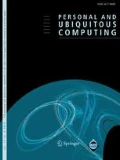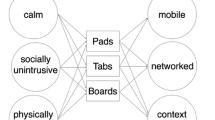Abstract
Literary criticism places fictional work in historical, social and psychological contexts to offer insights about the way that texts are produced and consumed. Critical theory offers a range of strategies for analysing what a text says and just as importantly, what it leaves unsaid. Literary analyses of scientific writing can also produce insights about how research agendas are framed and addressed. This paper provides three readings of a seminal ubiquitous computing scenario by Marc Weiser. Three approaches from literary and critical theory are demonstrated in deconstructive, psychoanalytic and feminist readings of the scenario. The deconstructive reading suggests that alongside the vision of convenient and efficient ubiquitous computing is a complex set of fears and anxieties that the text cannot quite subdue. A psychoanalytic reading considers what the scenario is asking us to desire and identifies the dream of surveillance without intrusion. A final feminist reading discusses gender and collapsing distinctions between public and private, office and home, family and work life. None of the readings are suggested as the final truth of what Weiser was “really” saying. Rather they articulate a set of issues and concerns that might frame design agendas differently. The scenario is then re-written in two pastiches that draw on source material with very different visions of ubiquitous computing. The Sal scenario is first rewritten in the style of Douglas Adams’ Hitchhiker’s Guide to the Galaxy. In this world, technology is broken, design is poor and users are flawed, fallible and vulnerable. The second rewrites the scenarios in the style of Philip K Dick’s novel Ubik. This scenario serves to highlight what is absent in Weiser’s scenario and indeed most design scenarios: money. The three readings and two pastiches underline the social conflict and struggle more often elided or ignored in the stories told in ubicomp literature. It is argued that literary forms of reading and writing can be useful in both questioning and reframing scientific writing and design agendas.
Similar content being viewed by others
References
Adams D (1986) The Hitch hiker’s guide to the galaxy: a trilogy in four parts. Heineman, London
Bardzell J, Bardzell S (2008) Interaction criticism: a proposal and framework for a new discipline of HCI. In: CHI’08: CHI 2008 extended abstracts on human factors in computing systems. ACM, New York
Bardzell, J. (2009). Interaction criticism and aesthetics. In: Proceedings of CHI’09: world conference on human factors in computing systems. ACM, New York
Bardzell S (2010) Feminist HCI: taking stock and outlining an agenda for design. In: Proceedings of the SIGCHI conference on human factors in computing systems (CHI ‘10). ACM, New York, NY, pp 1301–1310
Bell G, Blythe M, Gaver W, Sengers P, Wroght P (2003) Designing culturally situated products for the home. ACM, CHI
Bell G, Dourish P (2007) Yesterday’s tomorrows: notes on ubiquitous computing’s dominant vision. Pers Ubiquit Comput 11(2):133–143
Bertelson O, Pold S (2004) Criticism as an approach to interface aesthetics. In: Proceedings of the third Nordic conference on Human-computer interaction (NordiCHI '04). ACM, New York, NY, USA, pp 23–32
Blythe M (2004) Pastiche scenarios. Interactions 11(5):51–53
Blythe M, Wright P (2006) Pastiche scenarios: fiction as a resource for user centred design. Interact Comput 18(5):1139–1164
Blythe M, Dearden A (2009) Representing older people: towards meaningful images of the user in design scenarios. Univ Access Inf Soc 8(1):21–32
Blythe M, Robinson R, Frohlich D (2008) Interaction design and the critics: what to make of the “weegie”. In: NordiCHI 2008 20–22 October 2008, Lund, Sweden
Blythe M, Bardzell J, Bardzell S, Blackwell A (2008) Critical issues in interaction design. In: British HCI conference 2008. BCS, Liverpool, pp 182–184
Booker C (2004) The seven basic plots: why we tell stories. MPG Books, Cornwall
Braun N (2004) Storytelling and conversation to improve the fun factor in software applications. In: Blythe M, Overbeeke K, Monk AF, Wright PC (eds) Funology: from usability to enjoyment. Kluwer, Dordecht, pp 2233–2243
Butler J (1990) Gender trouble. Routledge, New York
Cooper A (1999) The inmates are running the asylum: why high-tech products drive us crazy and how to restore the sanity. Sams, Indianapolis
de Souza C (2005) The semiotic engineering of human computer interaction. MIT Press, Cambridge
Derrida J (2004) Writing and difference. Routledge, London
Dick PK (2004) Ubik. Orion, St Ives
Dourish P, Bell G (2013) Resistance is futile. Reading science fiction alongside ubiquitous computing. Pers Ubiquit Comput. doi:10.1007/s00779-013-0678-7
Dunne A, Raby F (2007) Design for debate: from applications to implications. Innovationsforum Interaktionsdesign. Potsdam, Germany. http://www.mefeedia.com/entry/anthony-dunne-dunne-raby/8254399/
Eagleton T (2012) The event of literature. Yale University Press, New Haven
Easthope A, McGowan K (1992) A critical and cultural theory reader. Open University Press, Milton Keynes
Fiennes S (2006) The Pervert’s guide to cinema. Documentary. Slavoj Zizek, Writer
Foucault M (1979) Discipline and punish: the birth of the prison. Vintage Books, New York
Gaver W, Sengers P, Kerridge T, Kaye J, Bowers J (2007) Enhancing ubiquitous computing with user interpretation: field testing the home helath horoscope. In: CHI. ACM, pp 537–546
Goffman E (1966) Asylums. Penguin, London
Jameson F (2005) Archaeologies of the future: the desire called Utopia and other science fictions. Verso, London
Kuhn T (1996) Structure of scientific revolutions. University of Chicago Press, Chicago
Light A (2011) HCI as heterodoxy: technologies of identity and the queering of interaction with computers. In: Interact Comput 23, 5 (Sept 2011), pp 430–438
Romero M, Pousman Z, Mateas M (2007). Alien presence in the home: the design of tableau machine. Pers Ubiquit Comput 12:373–382
Satchell C (2008) Cultural theory and real world design: Dystopian and Utopian Outcomes. In: CHI. ACM, Florence, pp 1593–1602
Sengers P, Boehner K, Mateas M, Gay G (2008) The disenchantment of affect. Pers Ubiquit Comput 12(5):347–358
Sengers P, Boehner K, Shay D, Kaye J (2005) Reflective design. In: CC '05 Proceedings of the 4th decennial conference on critical computing: between sense and sensibility. Aarhus, pp 49–58
Shelley PB (2008) A defence of poetry and other essays. Dodo Press, London
Triggle N (2006) How gadgets will aid the elderly at home. Retrieved Jan 27, 2009, from BBC News. http://news.bbc.co.uk/1/hi/health/4996890.stm
Weiser M (1991) The computer of the 21st century. Sci Am Spec Issue Commun Comput Netw
Wikipedia (n.d.) How William Shatner changed the world. Retrieved Jan 27, 2009, from Wikipedia: http://en.wikipedia.org/wiki/How_William_Shatner_Changed_the_World
Wikipedia (n.d.). Third-wave feminism. Retrieved Jan 27, 2009, from Wikipedia: http://en.wikipedia.org/wiki/Third-wave_feminism
Zizek S (2008) For they know not what they do: enjoyment as a political factor. Verso, London
Zizek S (2008) In defence of lost causes. Verso, London
Zizek S (2007) The universal exception: selected writings. Continuum, London
Acknowledgments
I would like to thank the anonymous reviewers of the paper for criticism and suggestions. I would also like to thank Jeffrey Bardzell for detailed comments and suggested deconstructive interpretations.
Author information
Authors and Affiliations
Corresponding author
Rights and permissions
About this article
Cite this article
Blythe, M. The hitchhiker’s guide to ubicomp: using techniques from literary and critical theory to reframe scientific agendas. Pers Ubiquit Comput 18, 795–808 (2014). https://doi.org/10.1007/s00779-013-0679-6
Received:
Accepted:
Published:
Issue Date:
DOI: https://doi.org/10.1007/s00779-013-0679-6



